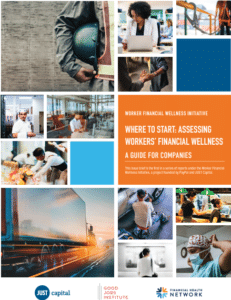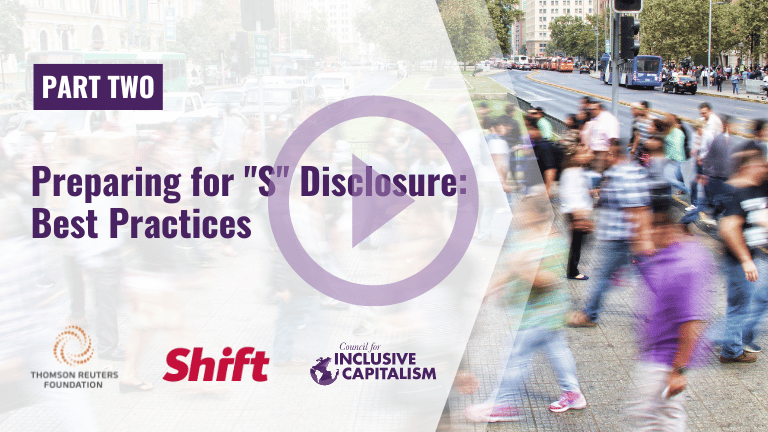Newsletter | Businesses thrive when they contribute to society

Notes from the Council | Newsletter October 2022
On the heels of the United Nations General Assembly and Climate Week in New York City, world leaders from the public and private sectors convened on ideas for a better future. I was delighted to join Council for Inclusive Capitalism members at the Clinton Global Initiative, and with Council steward Dan Schulman, President and CEO of PayPal, on the main stage at Fast Company’s Innovation Festival to urge peers to be part of a truly inclusive capitalism. I think Dan said it best when he quipped, “I think capitalism is a great system, but it clearly needs an upgrade.”
The private sector has the reach and resources to address climate change and economic inequality, and do so profitably. Although issues of moral leadership may feel far from the bottom line, they are critical to risk management in the near-term, trust building in the medium-term, and value creation in the long-term. If you lose the support of your customers, your employees, and your community, your organization will have no need to worry about the next earnings report.
Business is at its best when it profitably creates value for all members of society and regenerates the planet. It is not only the right thing to do, but it is also the business thing to do. We all play a role in fostering the stronger economies and societies necessary to benefit business performance in the long-term.
Members of the Council for Inclusive Capitalism are demonstrating their value creation by sharing their actions, strategies, resources, and stories of progress on the Council’s public platform. This is so powerful because of the impactful ideas and lessons within it that can challenge and motivate us all. We invite all business leaders to explore more than 650 company actions and to join us to contribute your actions to inspire others. Together, we can show the scale of business done right.

Lynn Forester de Rothschild
Founder and Co-Chair
Read more about the Fast Company event
Council learning series: Increasing focus on company “S” practices and value creation
In the environmental, social, and governance (ESG) space, social “S” indicators are perhaps the least defined but no less material than environmental factors to a company’s long-term profitability and lasting value creation. Governments, the public and investors and increasingly focused on the social impact of business practices, and companies have an opportunity to demonstrate the value they create.
A pair of webinars hosted by the Council for Inclusive Capitalism in partnership with Thomson Reuters Foundation and Shift, explored the rapidly-changing “S” disclosure landscape from economic, legal, investor, and company perspectives to help business leaders understand trends and access best practices and learning resources to measure and manage social impact. Click below to watch a recording of the presentations.

Market imperative: Making spirits sustainable with Suntory’s Takeshi Niinami
In 2050, half of the world could suffer from water shortages because of climate change and population growth. As the head of a global beverage company whose core business relies on water, Suntory Holdings Limited’s Tak Niinami is working to protect water resources as part of the company’s operations. In a new interview published in “Steps Forward” magazine, Niinami talks about the steps he and Suntory are taking to balance operations and environmental stewardship:
“We have set a goal of replenishing more than 100% of the water used in all factories in highly water stressed areas through local water source conservation efforts by 2030, and aim to achieve net water positive at all our factories globally by 2050.”
Suntory’s story is one of many shared in the 2022 edition of “Steps Forward,” a publication exploring inclusive capitalism in practice. Discover more from Council leaders in the online magazine.
Moral imperative: Judaism on the economy and social justice
The Council for Inclusive Capitalism offers its members opportunities to engage with the teachings of faith and ethical leaders on the moral imperative of the inclusive capitalism movement, including by inviting these leaders to share reflections with our community. Rabbi David Rosen, International Director of Interreligious Affairs at the American Jewish Committee, offers this passage from his ICCJ article Economy and Social Justice:
“The Hebrew Bible does not offer us a comprehensive economic program, but it provides guiding principles for a moral economy.
“Its vision of social justice flows from its teaching regarding life’s sanctity and inalienable dignity. God is merciful and “biased” toward the vulnerable. Because we are called to affirm the dignity of all, we are required to pay special attention to those whose dignity is vulnerable—the poor, strangers, widows, and orphans.
“The Torah is replete with commandments regarding our ethical responsibilities toward the vulnerable—the obligation to care for the stranger is repeated 36 times. Judaism requires its adherents to contribute at least a tenth of disposable income to righteous charitable deeds, and the Hebrew Bible requires farmers to refrain from reaping their fields’ corners, leaving their gleanings for the disadvantaged.
“At its foundation is the idea that human beings are no more than tenants on God’s land: all material gifts are granted to us as stewards, to be used for the common good. This sense of our transience and vulnerability is meant to animate our moral conduct.
“The slogan ‘Do well by doing good’ has become commonplace as a way to encourage corporate philanthropy. The religious ethic as reflected in Biblical and Talmudic teaching would rather argue that we “Do well in order to do good,” for the economic and social welfare of society at large is our common good and our moral responsibility.”
Read the full adapted article.
Steward action: PayPal and JUST Capital Worker Financial Wellness Initiative
 Two Council for Inclusive Capitalism members, JUST Capital and PayPal, in collaboration with the Financial Health Network and the Good Jobs Institute, established the Worker Financial Wellness Initiative to help C-suite executives and investors recognize the positive business outcomes of an employee financial wellness strategy and act to put one in place.
Two Council for Inclusive Capitalism members, JUST Capital and PayPal, in collaboration with the Financial Health Network and the Good Jobs Institute, established the Worker Financial Wellness Initiative to help C-suite executives and investors recognize the positive business outcomes of an employee financial wellness strategy and act to put one in place.
The Initiative’s “Where to Start: Assessing Workers’ Financial Wellness” guide offers a free framework for how companies can assess the financial wellness of their workers and discusses current research on why improving financial outcomes of workers also improves business outcomes, including reducing turnover and increasing both productivity and customer satisfaction.
The document draws lessons from PayPal’s experience. As described in an article co-authored by PayPal CEO Dan Schulman, in 2018 the company surveyed its hourly and entry-level employees and found two-thirds reporting periodically running out of money despite PayPal paying at or above market value wages: “the wages were not always sufficient for many families.” The company responded by increasing compensation, reducing the employee cost of medical benefits, and establishing an emergency fund for employees in need of financial assistance, among other actions.
Download the guide to learn more.
Ally resource: Creating value by investing in your company’s sustainable purchasing program
Sustainable purchasing achieves value for a company while building healthy communities, economies, and environments along local and global supply chains. The Sustainable Purchasing Leadership Council (SPLC), offers a variety of training programs, individual coaching, and resources to empower procurement professionals to leverage their organization’s purchasing strategy to create value for a wide range of stakeholders.
In a signature white paper, SPLC shares how teams from eight U.S. and international companies in a range of industries and sizes made the case for investment in their companies’ sustainable purchasing programs. Along the way, they describe how to tie sustainable purchasing outcomes to improved revenue, supplier engagements, corporate citizenship, reputation, and more.
Download the white paper.
Upcoming events
Thomson Reuters Foundation Trust Conference 2022
October 26-27
Each year the conference brings together some 600 delegates from diverse sectors representing more than 60 countries to tackle the gravest issues of our time at the intersection of socio-economic inclusion, sustainability, media freedom and human rights. This year, the first day of the conference focuses on the surging threats to media freedom and digital rights, and the second day addresses the need to build more inclusive and sustainable economies, at a time when global inequalities are deepening, alongside key issues arising from the transition to greener economies.
Find tickets online. Use discount code TCONCIC20 during registration for 20% off your Trust Conference ticket.
Putting Purpose at the Core of Business Practices
December 8, 4 p.m. GMT
What is the difference between “purpose” and “ESG”? Are they just two ways of talking about the same thing? And is it really possible — or desirable — to try to measure purpose in practice? In a one-hour webinar, we will explore the value of centering business practices around purpose for greater action and impact. This webinar builds on learnings from the two-part webinar “Preparing for S Disclosure.” An invitation with registration information will be sent out Council members soon.
Welcome New Council Member
| Mitchell Rabin Founder and CEO, A Better World Foundation Derek Handley Nadayar Enegesi Mark Ulrich Aisha Raheem Rahul Batra Alex Thaler Josh Zinner |
Celine Charron Co-founder, Leader Éveillé Vanda Berninger Brent De Jong Chris Larsen Sam Immanuel Joanne Bauer Baybars Altuntas
|
📰 Inclusive Capitalism in the News
PRNewswire | Punit Renjen: Deloitte updates audit committee guide to meet evolving risk landscape and regulatory environment
ROI NJ | René Jones: How M&T Bank is helping Black entrepreneurs survive and thrive
SmartCompany | Harvard Business Review: The essential link between ESG targets and financial performance
ECommerce News | Marc Benioff: Salesforce launches new research into net zero economy
ITUC-CSI.org | Sharan Burrow: On International Equal Pay Day the ITUC calls on all governments to adopt laws and reforms to close the persistent global gender pay gap of over 20%
Afrik 21 | Dr. Akinwuni Adesina: African Development Bank (AfDB) issues green rand bond to finance green projects
Manila Bulletin | Mark Schneider: Nestlé bats for decarbonization strategy
World Economic Forum | Stakeholder Capitalism Metrics Initiative: over 120 companies implement the ESG reporting metrics
Financial Times | Alistair Phillips-Davies: SSE pledges to reinvest windfall profits in UK energy assets
UK Today News | Cost-of-living crisis increases attention on ‘S’ in ESG

